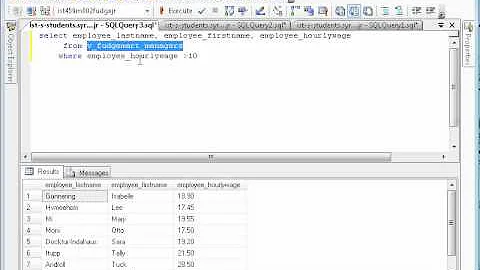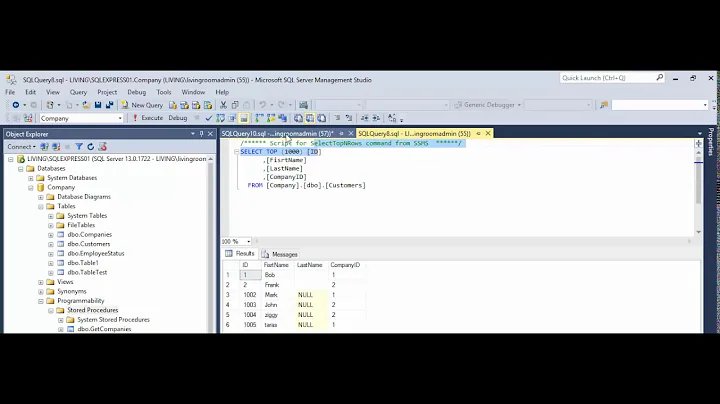Can we pass parameters to a view in SQL?
Solution 1
As already stated you can't.
A possible solution would be to implement a stored function, like:
CREATE FUNCTION v_emp (@pintEno INT)
RETURNS TABLE
AS
RETURN
SELECT * FROM emp WHERE emp_id=@pintEno;
This allows you to use it as a normal view, with:
SELECT * FROM v_emp(10)
Solution 2
There are two ways to achieve what you want. Unfortunately, neither can be done using a view.
You can either create a table valued user defined function that takes the parameter you want and returns a query result
Or you can do pretty much the same thing but create a stored procedure instead of a user defined function.
For example:
the stored procedure would look like
CREATE PROCEDURE s_emp
(
@enoNumber INT
)
AS
SELECT
*
FROM
emp
WHERE
emp_id=@enoNumber
Or the user defined function would look like
CREATE FUNCTION u_emp
(
@enoNumber INT
)
RETURNS TABLE
AS
RETURN
(
SELECT
*
FROM
emp
WHERE
emp_id=@enoNumber
)
Solution 3
Normally views are not parameterized. But you could always inject some parameters. For example using session context:
CREATE VIEW my_view
AS
SELECT *
FROM tab
WHERE num = SESSION_CONTEXT(N'my_num');
Invocation:
EXEC sp_set_session_context 'my_num', 1;
SELECT * FROM my_view;
And another:
EXEC sp_set_session_context 'my_num', 2;
SELECT * FROM my_view;
The same is applicable for Oracle (of course syntax for context function is different).
Solution 4
No you can't, as Mladen Prajdic said. Think of a view as a "static filter" on a table or a combination of tables. For example: a view may combine tables Order and Customer so you get a new "table" of rows from Order along with new columns containing the customer's name and the customer number (combination of tables). Or you might create a view that selects only unprocessed orders from the Order table (static filter).
You'd then select from the view like you would select from any other "normal" table - all "non-static" filtering must be done outside the view (like "Get all the orders for customers called Miller" or "Get unprocessed orders that came in on Dec 24th").
Solution 5
Why do you need a parameter in view? You might just use WHERE clause.
create view v_emp as select * from emp ;
and your query should do the job:
select * from v_emp where emp_id=&eno;
Related videos on Youtube
arunachalam
Updated on March 14, 2021Comments
-
arunachalam over 3 years
Can we pass a parameter to a view in Microsoft SQL Server?
I tried to
create viewin the following way, but it doesn't work:create or replace view v_emp(eno number) as select * from emp where emp_id=&eno;-
Epicurist over 7 yearsA view is a stored sql text of a select query. Parameters are out of the discussion. When your stored query returns the column where you want to filter with, you can do it in the calling query. E.g. "SELECT * FROM v_emp WHERE emp_id = ?"
-
Lukasz Szozda about 6 years@Epicurist
Parameters are out of the discussionToo bold statement. Counterexample
-
-
MikeMurko over 11 yearsWhat are the practical differences between this and a view? Can you assign user permissions to only access this function?
-
 bobobobo about 11 yearsIn MySQL you write a stored procedure and have the last statement in the procedure be the resultset you want returned.
bobobobo about 11 yearsIn MySQL you write a stored procedure and have the last statement in the procedure be the resultset you want returned. -
 mounaim over 9 yearscan we use that request without any problem from JDBC code in java ?
mounaim over 9 yearscan we use that request without any problem from JDBC code in java ? -
Doug_Ivison over 9 yearsIn some cases there will be a big performance improvement, when it's a
WHEREfor the table, instead of aWHEREfor the view. -
 TPAKTOPA about 8 yearsit would terrible to use it for a request to view. But it's really usable, as a configuration/stage/environment, to use such hidden parameters. A Plus for me for that.
TPAKTOPA about 8 yearsit would terrible to use it for a request to view. But it's really usable, as a configuration/stage/environment, to use such hidden parameters. A Plus for me for that. -
nagu over 7 years@MikeMurko one important difference is that the schema/metadata about the columns of a view can be queried if its a view. If its stored proc or a function, then I guess databases may not be able to give you that information.
-
Jmoney38 over 6 yearsIf you have a set of users who have access to your database, and you don't want them running "select * from [view]" and impacting performance, you could grant access to certain functions, which would FORCE them to provide filter parameters that, for example, leverage a certain set of index(es).
-
 Manngo about 6 years@MikeMurko The main practical difference is that with a view you can’t do it, and with a function you can. Each DBMS has its own quirks and limitations, and with SQL Server the one that applies here is that views cannot be parameterised. Another practical difference applies when you access the database from an external application. Normally you will see the tables, as well as views, which present as tables. Functions don’t. In this case it doesn’t matter since the whole point is to accept a parameter, which you wouldn’t be able to send in the external application.
Manngo about 6 years@MikeMurko The main practical difference is that with a view you can’t do it, and with a function you can. Each DBMS has its own quirks and limitations, and with SQL Server the one that applies here is that views cannot be parameterised. Another practical difference applies when you access the database from an external application. Normally you will see the tables, as well as views, which present as tables. Functions don’t. In this case it doesn’t matter since the whole point is to accept a parameter, which you wouldn’t be able to send in the external application. -
 Oleg Melnikov about 6 yearsIt should (PL/SQL and T-SQL are similar in many ways), but there is more than one way to find out :) Give it a try.
Oleg Melnikov about 6 yearsIt should (PL/SQL and T-SQL are similar in many ways), but there is more than one way to find out :) Give it a try. -
8forty about 6 yearsI think this is pretty handy. Similar to how parameters can be passed to web apps e.g. in Java.
-
 chb over 5 yearsIf you have doubts about the veracity of a response, don't post it before you verify that it's at least an adequate solution. As it stands, this is more of a question than an answer.
chb over 5 yearsIf you have doubts about the veracity of a response, don't post it before you verify that it's at least an adequate solution. As it stands, this is more of a question than an answer. -
 Riccardo Bassilichi over 5 yearseasy and functional! In other words... perfect! Thank You!
Riccardo Bassilichi over 5 yearseasy and functional! In other words... perfect! Thank You! -
 saastn over 5 yearsJust keep in mind that you can't use the SP option in a
saastn over 5 yearsJust keep in mind that you can't use the SP option in aSELECTeasily: read more. -
user123456 about 5 yearsI tired. Adding WHERE COUL = SESSION_CONTEXT(N'Ket'); in view result in Error 'SESSION_CONTEXT' is not a recognized built-in function name.
-
Lukasz Szozda about 5 years@user123456 You have to use SQL Server 2016 and above or Azure SQL Database
-
aruno over 4 yearsWhile what Doug says is somewhat true, modern databases can do a remarkable job of smartly 'expanding' a view and effectively ending up with the same result as if you were to just do the full query manually. So don't assume it will be inefficient because the database may surprise you - look at the generated query plan. A notable exception would be if the view has a GROUP BY clause that affects the output - in which case you couldn't do the WHERE from the 'outside'.
-
Devin Burke over 4 yearsThese are not the same. Imagine a view and a function that both return select * from user where active = 1. If you query select * from fn where key=5: the view will render as select * from user where active=1 and key=5 whereas the function will render as select * from (select * from user where active=1) as fn where fn.key = 5. Point: functions are self contained subqueries.
-
User1010 about 4 yearsOne problem with this solution will be that if the query is being run in multiple sessions the wrong data in the config table might be used
-
Zapnologica almost 4 yearsWould there be any performance issues or indexing issues by using this vs a view?








